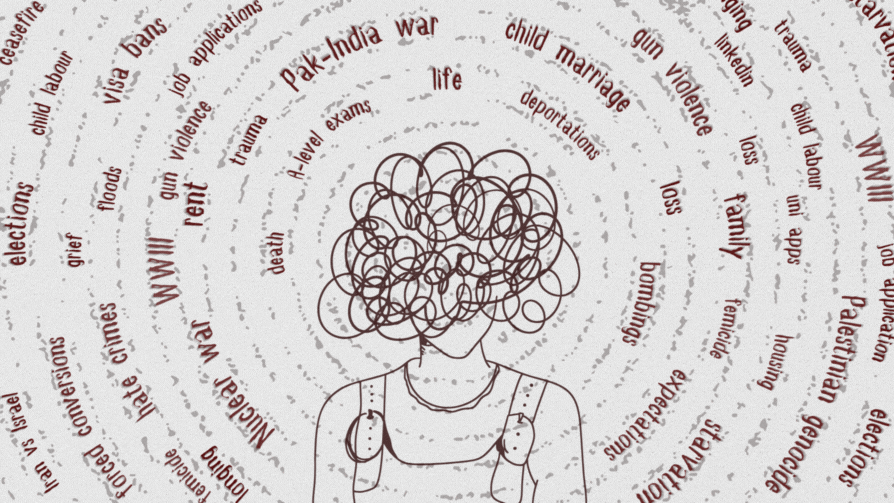My novel was an attempt to reconcile with a personal tragedy: writer Osama Siddique on his debut
In his opening tryst with fiction, Osama Siddique refashions and unravels millennia. With history being rewritten across much of the region, the writer speaks to Dawn on dissent, loss and longing across eras in Snuffing Out the Moon. In his expansive historical – encompassing six distinct eras – polymath Siddique mounts an ambitious debut.
Images:The expanse of your book encompasses distinct ages. Would it then be but natural for the erudite to see shades of Qurratullain Hyder’s Aag Ka Darya in your work?
Hyder is indeed one of my favourite Urdu writers and an artist of tremendous literary prowess and output. Aag Ka Darya had appreciable early impact for two reasons: first, the very idea of certain characters traversing different ages as well as Hyder’s ability to recreate the overarching mood and atmosphere of the times and adroitly employ their diction; and, second, in particular the exceedingly visual nature, abiding romance and subtle aesthetics of the sanskritised language of the first 50 odd pages as Gautam Nilambar – a young Buddhist monk – travels across a rain-filled monsoon landscape and ruminates on the nature of existence.
Having said that Snuffing Out the Moon and Aag ka Darya are quite different books even allowing for the fact that they are set in more than one age – her masterpiece in three and my humble attempt in six, including the near future. Hyder’s primary preoccupations in her book are certain philosophical discussions that her characters engage in.
In Snuffing Out the Moon I am, however equally keen to tell certain stories quite apart from endeavouring to create a book of ideas. Hence, the imperatives of plot and story do dictate the progress of my book and much as it also explores the broader themes of political and ideological evolution of man, the relationship between the individual and the state through the ages, the concepts of evil, conformism and dissent, and the price of dissent etc., I strive to do so through the stories rather than through philosophical discourses placed as such in the novel’s text.
Furthermore, Hyder’s three eras are contiguous and the same characters appear to populate them whereas Snuffing Out the Moon has contiguous as well as non-contiguous eras and a completely different cast of characters in each. Regardless of all this, however, any tangential link or attempted comparison with Hyder’s classic is nothing but highly flattering for me. She is quite the literary icon as far as myself and many other students of literature are concerned.
There is ample attention devoted to Jehangir’s inclination towards the spiritual over the book. Anarkali and the emperor’s affinity for rain also make fleeting appearances. Where though, among the elements, holy men and courtesans is Jehangir’s favoured consort, Nur Jahan?
Perhaps she is not so favoured any more at the time when the book examines the life of Jehangir. Perhaps his passion has become jaded. Perhaps she appears now to him as the embodiment of the status-quo, of dull and tedious political machinations and statecraft, and as a brilliant and somewhat overbearing co-ruler rather than a favoured consort and favourite muse.
Perhaps her deliberate absence from the narrative evidences Jehangir’s discontent for she is no longer the balm for his inner sorrows. That is why he is nostalgic about Anarkali, and remains increasingly depressed by the monotony of his royal role-play, and thus finds refuge and escape in, inter alia, the liberating idea of rain.
In any event, what I try and explore in the novel is the inner and increasingly melancholic world of Jehangir – a highly perceptive, aesthetic and reflective man – who appears progressively less interested in all that he possesses and that attracts all the various characters on the road to Lahore who aspire to his wealth and his glory.
Thus one man’s paradise is another man’s hell. My intent here is also to excavate the more private Jehangir – of whom we get some idea in the Tuzk-e-Jehangiri but who remains largely enigmatic behind images of the rich robe wearing, globe holding, hallo-headed figure in gilt-edged miniatures. And, thereby, distance myself from unflattering and likely inaccurate popular descriptions of an opium eating, Nur Jahan pecked, and zealously decadent royal. The Jehangir of Snuffing Out the Moon is a much more feeling and philosophical man.
Images: In contemporary Lahore, a weary character finds everything she has been deprived of and more at a noted burial site. Has an unashamedly criminal world restricted solace to such spots?
Rafiya Begum’s journeys to the graveyard are both acts of love and devotion for she goes there to visit the precious one she has lost as well as acts of escape as the legal system grinds her down. As a lawyer I have often come across Rafiya Begums and other wretched souls like her – hapless, dejected and broken as they fail time and again in protecting even their most basic rights.
The unfeeling system chews and spits them out and society marginalises them and thus they have no choice but to seek refuge in graveyards, compounds of tombs of Sufi saints and various public spaces. In many ways, we are a very large-hearted people but at the same time as a collective we are also guilty of tremendous apathy as we benumb ourselves to the sights of misery that surround us.
The graveyard is of course also a highly evocative and thought provoking place as it contains the remnants of so many past lives and their forgotten stories that remain eternally mute and unknowable for any visitor, except for those with any links to the deceased. It is also a bridge between epochs and ages and thus provides an important connection with the past.
It, along with the busy roads that skirt it, is also a world of paradoxes for it juxtaposes the unliving against the living, silence against sound, calm against commotion and closure against continuation. It stands for solace as well as desperation and decrepitude – it all depends on who comes to it and under the influence of which emotions and memories. It is a metaphor for many things and a symbol with various nuances and I have endeavoured to employ its multi-faceted nature.
Is revolt the chief leitmotif in Snuffing Out the Moon or loss?
I would like to think that this is a book with more than one central idea. Dissent against abuse of political authority and resistance against the dogma of centralized religion are indeed pivotal themes therein.
But the idea is also that the creation of new and more pernicious hegemonies as well as the ‘othering’ of one group of people by another and thus formulation of ever-new apartheids can be seen as a constant throughout human history.
That then begs the question as to what exactly are the defining characteristics of human political and social evolution. Are we even evolving or are we merely repeating ourselves, thus caught up in a cycle of turmoil and exploitation? In which direction is the human civilisational experiment headed? What have we learnt and how have we improved, if at all?
Juxtaposed against all this is also the notion of evil. Humans are guilty of the most atrocious of crimes against other humans and that has been the case all through civilisational existence? What is the nature of what we describe as evil? Is it something inherent to our psyche or a combination of external influences and imperatives? Is there an actual physical form to it – a devil incarnate – or is evil essentially an abstract idea? Or is it both? How do religion and mythology deal with these questions?
Furthermore, the novel also dwells upon the possible commonality of human sentiments, emotions and aspirations that drive their actions – may it be in the brick cities of the Indus civilisation or the imagined water conglomerates of the future. Yet another important theme is that of the deep relevance of the past to the present and the future – of the crucial role of history, both as something that moulds future events as well as a transcript of human achievement and folly. And also for that reason the concerted attempts by various hegemonies and obscurantisms to purge, rewrite or misrepresent history.
Images: The use of belief systems to further nefarious designs is a recurrent theme across select ages you navigate. Is organised religion susceptible to abuse?
Superstition, empty ritual and dogma have always been the foes of rationality, pragmatism and much more importantly, humanism.
At the same time, there is a strong nexus between the former and exercise of unquestioned and brutal power – between assumption of exclusive authority to interpret matters of faith and despotism. The theme fascinates me and that is not only because organized religion, official religion, religion of a dominant people etc., have played such an important role in politics through the ages but also because religion (voluntary and enforced) has played such an important role in the individual lives and the happiness and lack thereof of so many millions of individuals.
This is of course not just a topic of historical relevance or interest. We are currently witness to how organized religion, a belligerent clergy, a complicit and opportunistic political class and select and distorted visions of past and future utopias are being employed to create and sustain highly volatile and intolerant majoritarianisms in various parts of the world – in particular in our region. Religious bigotry and prejudice are the biggest threats to social plurality, tolerance and syncretism in an area that houses remarkable diversity – they pose the very real potential for unimaginably destructive strife.
Of the six narratives constituting the novel, four are primarily set in what today would be the Punjab. What explains the paucity of Pakistan’s other provinces across fiction in English from this part of the world?
Speaking of myself the geographical locations in Snuffing Out the Moon have been determined by the presence there of the main political and cultural centers that I write about – it being a historical novel. And it so happens that these are the civilisational spots that I am also most interested in, have grown up close to and know a little about.
Both the Indus Valley civilisation and the Gandharan civilisation had a very prominent presence in Punjab and then of course Lahore was pivotal to the Mughals, the English and now to Pakistan. I also feel quite strongly that for a city of such remarkable grandeur, multifariousness and beauty it remains underexposed to a larger audience. It is also a city where I was born and have spent most of my life.
All these factors along with the particular stories that I wanted to tell combine to define the geographical expanse covered by the book – some of the stories do cause the narrative to gravitate towards and encompass certain fabulous locations in Madhya Pradesh as well; and then Mohenjo Daro of course figures very prominently.
As to paucity of non-Punjabi locations in fiction in English emerging from Pakistan there could be multiple explanations. There is first of all not that much written so far and that will hopefully change. Let us also not forget the several recent books set in Karachi, which at times also foray into other parts of Sindh. Much of Pakistani fiction in English admittedly revolves around urban life and since the critical mass of those who write in English primarily lives in Karachi and Lahore we find that most books are set in those cities. Then there are those who want to write the immigrant novel or a more global novel. Commercial imperatives may also play a role as people are tempted to write about what is more widely known and recognized, fearing that readers may be less interested in the less prominent and the more obscure. But there are many, many good books yet to be written and Pakistan is a treasure cove when it comes to diversity, themes and locales as well as characters. An example of a very good recent book of stories set in Pakistan’s tribal areas and Balochistan is the late Jamil Ahmad sahib’s The Wandering Falcon. But I agree. We need to get more adventurous.
To paraphrase Saadat Hasan Manto, why do you write?
It is but a feeble attempt to convey that I too was here. Not much different perhaps from the faded graffiti that can be found in the most eroded of ruins.
The outcome of yet another ordinary soul’s sense of bewilderment at the enormity of the universe and the utter insignificance of our individual and collective existence, its depressing impermanence, and the fickleness of all that we aspire to.
And yet we are remarkable creatures as well – aren’t we? We are capable, despite our vulnerability and transience, of such loftiness of thought, such ambition, and such insight as out wealth of great literature demonstrates. Anyone possessed of some sensitivity and imagination can’t help but be deeply impacted by the wonder of existence. Writing was the natural outlet for me – the most logical tool to make sense of it all for myself and to communicate which is another compelling human need. Thus, writing is essentially something that I have done in one form or another all my life.
Writing – and indeed this book – is also therapeutic. It has always been not just a mechanism for active reflection and a tool for communication but indeed also a balm. This novel was also an attempt to reconcile with a personal tragedy. And it did help.
And finally, writing is also a political act. Indeed perhaps the most political of acts. Every deliberate or subconscious stance and idea in the book is a political statement and a position. No wonder proscribing books is the first thing undertaken by any hegemony and the burning of books is its most representative repression.
One writes also because more so than ever before there is the acute need to enrich the world of ideas and to generate discussions and discourses as we appear to be entering yet another age of intellectual darkness.
In particular, we as a culture have steadily declined from one with many, very good books to one with relatively few and fairly ordinary ones – we are thus quickly forgetting what it means to lead a life of the mind and to formulate events and evenings around ideas and books. We – and indeed much of the world – is turning into a deeply anti-intellectual place. And an intolerant one. We need more books as well as conversations. More dialogues instead of monologues.
Lawyer, academic, consultant and now author. You don many hats. Pick a favourite.
Obviously none. And yet equally obviously, all of them. Else I would not have done it. Life is too short to restrict oneself to a single vocation. Life is also too complex for a single point of view and a solitary lens to make sense of its varied nature. Wearing different hats at least allows ones different perspectives and insights.
Snuffing Out the Moon* received mixed reviews. How does it feel to have your work panned and praised in quick succession?
It’s still early days and therefore I look forward to some serious critical appraisal as well as critique. Quite apart from the various favourable reviews, so far I have only had two irate reactions and they are amusingly didactic.
Almost, like moral instructions from a pedantic grandaunt. For instance, while commending me for my ‘knowledge,’ ‘imagination’ and ‘ingenuity’ one of the two fastidiously ‘cautioned’ me to be modest as this was only my first work of fiction, and further advised that I surrender in humility before ‘the authority of fiction.’
Eager to oblige as I am, I must confess that I really don’t know what that means and how to do that. Just to play it safe I did bow a few times in the direction of the bookshelves in my study that contain novels.
How unfair though, thought I, to exhort me to bow to authority when ironically my book is overwhelmingly about not bowing to authority, and thus an ode to dissent.
Critics are a writer’s occupational hazard and a tolerable nuisance but I have been much more taken aback by the generous praise and positive reception for the book so far. Not just in terms of the various positive reviews and interviews, the excerpts appearing in Granta, Hindustan Times and many other prestigious publications, and words of praise and support, in particular from literary luminaries like Shamsur Rahman Faruqi sahib and Bapsi Sidhwa sahiba to polymaths like Shashi Tharoor to highly respected historians like Professor Ayesha Jalal.
Equally, I have been overwhelmed by the favourable feedback from many lay readers who have written to me or approached me – young academics, students, professionals, book club members and also older and avid book lovers including retired bureaucrats, judges, journalists, scholars and writers.
Someone also alerted me to the pitfalls of being too ambitious. Snuffing Out the Moon is admittedly a very ambitious book. I have deliberately abandoned the conventional confines of time and space and the convenient formulaic predictability of what a Pakistani novel should look like and grappled instead with questions that are overarching, themes that are more complex and abstract, and stories that are universal.
It obviously took a major investment of time and effort on part of the writer and asks for some of the same from the reader. It is a book meant to be consumed at leisure, and hopefully reflected upon. It offers comparatively very little instant gratification of the fast food variety. Thus, it isn’t fried chicken nuggets with one kind of sauce. Instead, it is more akin to a complex, multi-flavoured dish for the discerning and best served in several courses over a long and leisurely afternoon.








Comments